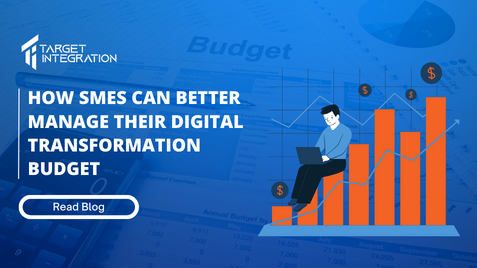As we kick off 2024, the imperative to embrace digital transformation is clear; it is no longer a luxury but a necessity for staying competitive and fostering growth. However, this journey presents a unique set of challenges for SMEs, primarily revolving around budget constraints. Last month I wrote about €78 million tech blunder. Unlike these large corporations with significant capital reserves, SMEs often operate with limited financial resources, making strategic decisions about where to invest particularly critical.
The landscape of digital transformation offers vast opportunities but also demands careful navigation. For SMEs, the task is not just about adopting new technologies but doing so in a way that aligns with their financial realities. This delicate balancing act requires a nuanced approach, where innovation must be pursued without jeopardising financial stability.
Thankfully, the Government is aware of the challenges facing businesses and has introduced several measures to support SME digitalisation, which we’ve flagged later in this article. While effective planning is critical, it’s nice to know the financial burden doesn’t fall entirely on your business. But before we get into that, it’s important to understand the implications that tighter budgets have on SMEs.

Budget Constraints and their impact on SMEs
In the pursuit of digital transformation, SMEs often encounter significant budgetary constraints. These financial limitations pose a distinct challenge, particularly when set against the backdrop of an ever-evolving technological landscape. SMEs, which typically operate with leaner resources compared to larger counterparts, face the pressing task of optimising their limited budgets while striving to keep up with digital advancements.
The impact of these budget constraints on SMEs is multi-faceted. Firstly, there is a direct effect on the ability to procure cutting-edge technology and tools. Advanced digital solutions often come with substantial costs, placing them out of reach for many SMEs. This financial barrier can lead to a technological gap, leaving smaller enterprises lagging behind larger ones that can afford such investments.
Secondly, budget limitations can affect the scope and speed of digital transformation initiatives. In an ideal scenario, an SME would comprehensively embrace digitalisation across all its operations. However, budget constraints often necessitate a more selective approach, focusing on areas deemed most critical to immediate business needs. This piecemeal adoption can sometimes result in missed opportunities for greater efficiency and innovation.
Moreover, the budget constraint often translates to a constraint on talent. While tech took a bit of a beating in 2023, recruiting and retaining tech talent remains extremely costly, putting such people beyond the reach of many SMEs. This lack of in-house digital expertise can further impede the effective planning and implementation of digital strategies.
Nevertheless, it’s important to note that these challenges, while significant, are not insurmountable. By carefully prioritising investments, exploring cost-effective digital tools, and leveraging various funding options, SMEs can embark on a digital transformation journey that aligns with their financial realities and business objectives.

Strategies for Managing Budget Constraints
With limited financial resources, Irish business owners must strategise meticulously, ensuring that every investment in digital technology yields maximum benefit. Below are some key strategies that SMEs can adopt to navigate their budgetary limitations while still advancing their digital transformation goals.
- Identifying core areas for digital investment: The first step is to conduct a thorough assessment of the business to identify areas where digital investment can have the most significant impact. This involves understanding which aspects of the business will benefit most from digitalisation, be it customer relationship management, supply chain efficiency, or online sales channels. Prioritising these areas ensures that limited resources are channelled into initiatives that offer the highest return on investment.
- Budget planning and allocation for digital initiatives: Effective budget management is critical. SMEs should develop a clear budgeting plan that outlines the costs of different digital initiatives and their expected impact. This might include a mix of one-time investments, like the purchase of new software, and ongoing expenses, such as training and maintenance. A well-planned budget helps in allocating funds judiciously, avoiding over-expenditure in certain areas at the expense of others.
- Cost-effective approaches to digital transformation: Exploring cost-effective digital solutions is vital. This includes researching and identifying affordable or open-source digital tools that meet business needs without compromising quality. Cloud-based services, for example, can offer scalable and cost-effective alternatives to expensive on-premise solutions. Additionally, SMEs can benefit from customised digital solutions tailored to their specific budget and business requirements.
- Phased implementation approach: Implementing digital transformation initiatives in phases can be a practical approach for managing costs. This allows SMEs to spread the investment over time, reducing the financial burden. A phased approach also provides the opportunity to assess and learn from each stage of implementation, making adjustments as needed for future phases.
By adopting these strategies, SMEs can better manage their budget constraints, ensuring a more sustainable and effective digital transformation journey. The key lies in careful planning, prioritising high-impact areas, exploring cost-effective digital solutions, and adopting a phased implementation approach. With these strategies in place, SMEs can navigate the financial challenges of digital transformation, positioning themselves for sustainable growth and competitiveness.

Funding options for digital transformation
Regardless of how well you plan, at some stage, your digital transformation is going to hit your bank balance. While managing internal budgets is important, several external funding options can provide the necessary boost to propel your digital initiatives. Chief among these is:
Grants and Government funding
The Irish Government offers grants and funding at all levels, specifically designed to support SMEs in digitalisation efforts. These grants often focus on enhancing technological capabilities, boosting innovation, or improving competitiveness. Below are some of the most popular digital transformation grants available to Irish SMEs:
- Enterprise Ireland’s Digitalisation Voucher: Enterprise Ireland offers the Digitalisation Voucher, designed specifically for Irish SMEs. This voucher provides financial assistance to access external consultancy services to kick-start digital projects. It covers areas such as developing a digital strategy, optimising processes, or enhancing cybersecurity.
- Local Enterprise Office (LEO) Grants: The Local Enterprise Offices across Ireland provide various grants and support for SMEs embarking on digital transformation. These include the Trading Online Voucher Scheme, which offers financial assistance to businesses looking to develop or upgrade their online trading presence. LEOs also offer Business Expansion Grants and Feasibility Study Grants, which can be used to fund digital projects.
- Innovation vouchers by Knowledge Transfer Ireland: This initiative, offered through Knowledge Transfer Ireland, allows SMEs to collaborate with research institutions. These vouchers can be used to seek expert advice on digital innovation, helping SMEs explore new digital technologies or processes.
- Technology Gateway Funding: The Enterprise Ireland Technology Gateway Network offers support to SMEs for research and development in technology-based projects. This funding can be particularly beneficial for SMEs looking to develop new or enhance existing products, processes, or services through digital technologies.

Bank loans and financial institutions
Traditional bank loans can be a viable option for funding digital projects. Banks and other financial institutions often have specialised loan products for SMEs looking to invest in technology.
Venture capital and angel investors
For SMEs with innovative digital transformation projects, seeking investment from venture capitalists or angel investors can be a strategic option. These investors not only provide financial backing but can also offer valuable expertise and networking opportunities. However, this often requires a compelling business case and a clear demonstration of the potential return on investment.
Crowdfunding
An increasingly popular avenue, especially for SMEs with creative and innovative digital projects, is crowdfunding. Platforms like Kickstarter or Indiegogo allow businesses to raise funds directly from the public, often in exchange for early access to products or other rewards.
By utilising these funding options, SMEs can supplement their internal budgets, providing a stronger financial foundation for their digital transformation initiatives. It’s essential for SMEs to thoroughly research and evaluate each option to determine the best fit for their specific needs and circumstances.
To summarise, balancing budget constraints with the need for digital innovation requires a strategic approach. By prioritising key areas, managing budgets effectively, exploring cost-effective solutions, and leveraging external funding, SMEs can navigate the complexities of digital transformation. These steps not only enable your business to keep pace with technological advancements but also enhance your competitiveness and growth potential. The journey may be fraught with challenges, but with careful planning and resourcefulness, SMEs can successfully embark on their digital transformation journey, ensuring a sustainable and prosperous future.
At Target Integration we’re experts in SME digital transformation. Get in touch to arrange a free consultation.



